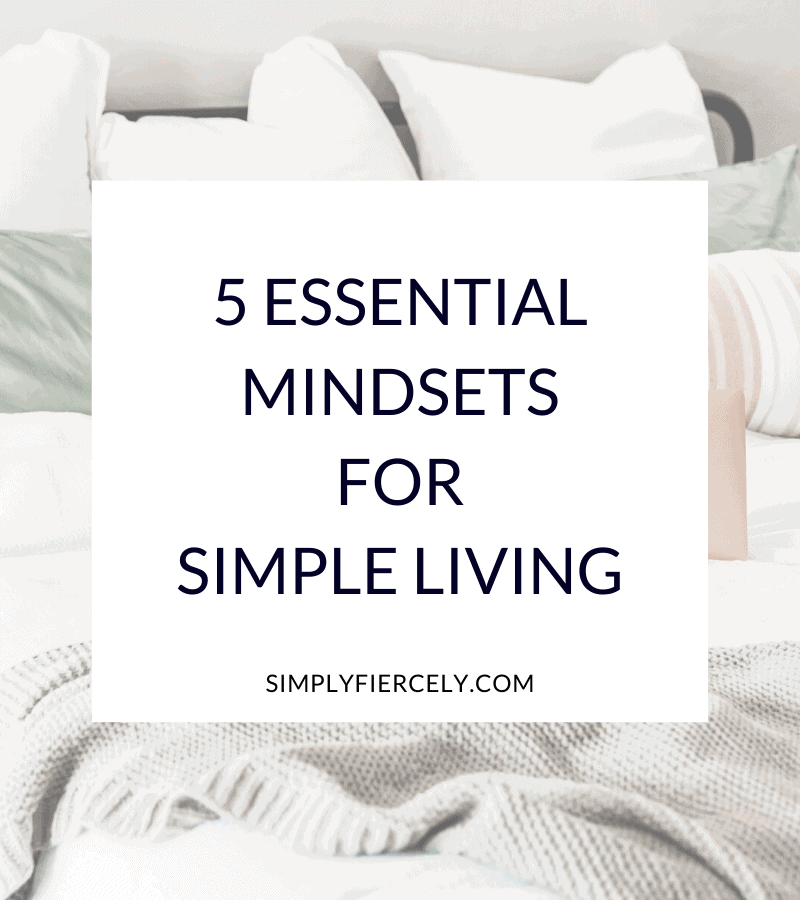When I first started exploring simple living, I remember feeling overwhelmed by all the changes I wanted to make. I knew I desperately needed to declutter my home, become less busy, and get my spending under control—only then could I have the slow, intentional life of my dreams.
Or so I thought…
Looking back now, I know that external changes like decluttering are only one piece of the puzzle. The real key to simplifying your life is learning how to think differently. When you develop the essential mindsets for simple living you experience meaningful change from the inside out.
This is so important because honestly if you don’t change your thoughts and beliefs, everything else is superficial. It doesn’t matter how much you slow down or declutter … if you’re not in the right headspace then you’re not going to feel different in the long term.
If you’re craving simplicity in your life, try developing these five mindsets first—and then watch as your external reality begins to reflect your inner beliefs.

Mindsets for Simple Living
I KNOW WHAT MATTERS TO ME
First and foremost, if you want to simplify your life, you must cultivate the confidence and clarity to both define and defend what matters most to you. This might sound deceptively easy—but how well do you really know your values and priorities?
At the heart of things, living a simple life means choosing what matters over the non-essential. It requires saying “no” to many good opportunities in order to create time and space for the things that make you feel alive.
Sometimes these choices are simple—like turning down dinner with friends because it’s your son’s birthday—but it’s not always so straightforward. What about a new job that requires extensive travel and time away from home? Or a bigger home with more space … and a bigger mortgage?
There are no right or wrong answers and these are never easy decisions—but when you know what truly matters to you, you have the confidence to follow your heart instead of the status quo.
This is how you create space in your home, your schedule and your mind, all of which contribute to simple living.
If you’re struggling to clearly define your priorities then I invite you to check out Values + Vision. In this course, you’ll take a deep dive into your values and learn how to align your life with what matters most. Click here to learn more.
I AM NOT DEFINED BY WHAT I OWN
Most of us know—in theory—that we are not defined by the things we own … but do your actions ever contradict this belief?
I say this with compassion because I’m still a work in progress. Sure, I’ve come a long way over the years (check out my minimalist story for more details) but this doesn’t mean it’s easy. For example, I have two young children and I often catch myself believing that owning certain toys or books will make me a better parent.
When I notice these thoughts, I have to step back and remind myself of what I believe in.
It’s a continual process and I don’t always listen to my inner voice but with practice, this mindset is becoming stronger and stronger. The more I believe in my self-worth, the less I’m tempted to define myself by what I own (or to a certain extent, by the things I do as well).
Related Post: A Helpful Guide to Minimalism With Kids
MY TIME IS VALUABLE
Speaking of self-worth—how highly do you value your time? Do you treat it as a limited commodity worth protecting? Or do you freely give it away without consideration?
If you want to find balance in life and experience the ease that comes with simple living, you must believe your time is valuable and act accordingly. More time equals freedom to live slowly and on your own terms.
Here are a few questions that will help you recognise if you need to value your time more:
- Do I set clear boundaries with others? Or am I too quick to sacrifice my time and energy?
- Am I aware of the relationships between time and money? (Most people trade their time for money via their job.) Do I often waste my time/money on things of little value?
- How much time do I spend each day caring, cleaning and maintaining my physical possessions? Are these items really worth the time I’ve sacrificed?
If you’re unhappy with any of your responses, try writing a list of all the things you’d do if you had more time. Then next time you’re tempted to sacrifice your time, take a look at your list and pay attention to what you’re really giving up.
This will help you see the value of your time and hopefully, empower you to protect it.
Related Post: 9 Actionable Ways To Declutter Your Schedule + Be Less Busy

I CAN BALANCE INTENTIONS WITH EXPECTATIONS
When I was pregnant with my first child, a yoga instructor taught me something powerful about balancing intentions with expectations.
(We were discussing childbirth but honestly, it’s relevant to everything in life—so stick with me!)
Imagine for a moment that you’re shooting an arrow. While the arrow is in your bow, you close one eye, focus on the target, and do your best to aim for the bullseye.
But then … you let go.
The arrow flies forward and you’re no longer in control. No matter how good your aim or how skilled you are, a sudden gust of wind could blow your arrow off course and there’s nothing you can do about it.
The moral of this story is no matter how much you prepare (for childbirth or anything in life), sometimes things don’t go to plan. This doesn’t mean you shouldn’t bother preparing—you still aim for the target—but once you let go of what you can control, you release your expectations.
Simple living requires this same delicate balance.
You should absolutely make intentional choices about your life but you should also know how to let go of expectations when things are beyond your control. This is the ebb and flow that leads to simplicity from the inside out.
I KNOW HOW MUCH IS ENOUGH
For many people, a lack of simplicity stems from a constant feeling of “not enoughness”.
Not enough time, not enough money, not thin enough, not smart enough … the list goes on and on. There is always something else to chase and as a result, life is never simple or slow.
Of course, we tell ourselves that “someday” things will be better. We just need to buy one more thing, earn a bit more money, or get through one more busy season at work.
But you know how it goes, right? One more thing turns into one more thing—and so it continues.
It can feel like you’re trapped in a never ending cycle but the good news is you have the power to stop anytime. All you need to do is cultivate a mindset of enoughness.
Ask yourself questions like:
- How much do I need to be happy?
- If I’m not happy now, why do I think ____ will make me any happier?
- What do I need to sacrifice to have more? Is it worth it? Or can I learn to be happy with what I have?
As with most things, there are no right or wrong answers, but clearly defining what “enough” means to you is the foundation of simplifying.
Instead of endlessly chasing more, more and more, you can create boundaries and space to enjoy the simple things in life.
More Simple Living Resources
If you want to learn more about simple living, be sure to check out:
- 7 Simple Living Podcasts to Inspire You
- 7 Journal Prompts to Inspire Simplicity
- 13 Simple Living Tips: How to Stress Less + Enjoy Life
- 7 Simple Days—A short course that will help you kickstart your simple living journey.
What mindsets have helped you on your simple living journey? And what mindsets are you still working on? Let us know in the comments!

This is such a fantastic post! It really speaks to me – I’m working through decluttering the physical things in the house but know I have some deeper work to do within myself to live simply. Your article was the most helpful that I have read! Thank you for your wise words. Beautiful post. 💜
I absolutely love this article Jennifer! I love how you talk about knowing what enough is. I think that is the most important part. That’s also the hardest part because our consumer society is always telling us that there is never enough.
I have found that what helps me know what is enough is stopping to appreciate what I already have. When you see the clothes you love to wear in your closet, the decorations that are meaningful in your home, the things that you use every day, the roof over your head and the love in your home you grow contentment. Contentment helps you feel full and that helps you know you have enough. Knowing that I have enough has helped me to save money, pay off debt, have lots of cool adventures, develop friendships, learn new skills, lose weight, stop bad habits, and more! It really is the key to EVERYTHING!
You are wise beyond your years! Thank you for the insightful words that you send us.
I love this article. Very helpful and relateable. Thank you!
I just love your posts. Thank you so much for sharing your heart.
This made me smile. Thank you so much for your kind words, Angie! Take care 🙂